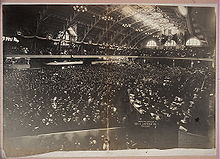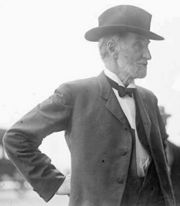
1904 Republican National Convention
Encyclopedia

Republican Party (United States)
The Republican Party is one of the two major contemporary political parties in the United States, along with the Democratic Party. Founded by anti-slavery expansion activists in 1854, it is often called the GOP . The party's platform generally reflects American conservatism in the U.S...
of the United States
United States
The United States of America is a federal constitutional republic comprising fifty states and a federal district...
was held in the Chicago Coliseum
Chicago Coliseum
The Chicago Coliseum was the name of a succession of three large indoor arenas in Chicago, Illinois from the 1860s to 1982 that each served as a sports venue, convention center, and exhibition hall over the course of their respective histories. The first Coliseum briefly made an appearance in the...
, Chicago, Cook County
Cook County, Illinois
Cook County is a county in the U.S. state of Illinois, with its county seat in Chicago. It is the second most populous county in the United States after Los Angeles County. The county has 5,194,675 residents, which is 40.5 percent of all Illinois residents. Cook County's population is larger than...
, Illinois
Illinois
Illinois is the fifth-most populous state of the United States of America, and is often noted for being a microcosm of the entire country. With Chicago in the northeast, small industrial cities and great agricultural productivity in central and northern Illinois, and natural resources like coal,...
, on June 21 to June 23, 1904.
The popular President
President of the United States
The President of the United States of America is the head of state and head of government of the United States. The president leads the executive branch of the federal government and is the commander-in-chief of the United States Armed Forces....
Theodore Roosevelt
Theodore Roosevelt
Theodore "Teddy" Roosevelt was the 26th President of the United States . He is noted for his exuberant personality, range of interests and achievements, and his leadership of the Progressive Movement, as well as his "cowboy" persona and robust masculinity...
had easily ensured himself of the nomination, though a threat had come from the Old Guard favourite Ohio Senator
United States Senate
The United States Senate is the upper house of the bicameral legislature of the United States, and together with the United States House of Representatives comprises the United States Congress. The composition and powers of the Senate are established in Article One of the U.S. Constitution. Each...
Mark Hanna
Mark Hanna
Marcus Alonzo "Mark" Hanna was a United States Senator from Ohio and the friend and political manager of President William McKinley...
, the loyal kingmaker in Republican politics. But the senator had died early in 1904 therefore ending all opposition in the Republican Party
Republican Party (United States)
The Republican Party is one of the two major contemporary political parties in the United States, along with the Democratic Party. Founded by anti-slavery expansion activists in 1854, it is often called the GOP . The party's platform generally reflects American conservatism in the U.S...
.
Roosevelt's nomination speech was made by former New York Governor Frank S. Black
Frank S. Black
Frank Swett Black was an American newspaper editor, lawyer and politician. He was a member of the United States House of Representatives from 1895 to 1897, and the 32nd Governor of New York from 1897 to 1898.-Life:He was one of eleven children of Jacob Black, a farmer, and Charlotte B. Black...
and it was seconded by Indiana Senator Albert Beveridge. Roosevelt was nominated by 994 votes to none. The other threat to Roosevelt, Indiana Senator Charles Warren Fairbanks was nominated for Vice President
Vice President of the United States
The Vice President of the United States is the holder of a public office created by the United States Constitution. The Vice President, together with the President of the United States, is indirectly elected by the people, through the Electoral College, to a four-year term...
.
Platform

Gold standard
The gold standard is a monetary system in which the standard economic unit of account is a fixed mass of gold. There are distinct kinds of gold standard...
, expansion of the Merchant Marine and strengthening of the United States Navy
United States Navy
The United States Navy is the naval warfare service branch of the United States Armed Forces and one of the seven uniformed services of the United States. The U.S. Navy is the largest in the world; its battle fleet tonnage is greater than that of the next 13 largest navies combined. The U.S...
; it also praised Roosevelt's foreign and domestic policies.
Other candidates for the Presidential nomination
- Mark Hanna (Ohio)
- Charles W. Fairbanks (Indiana)
See also
- 1904 Democratic National Convention1904 Democratic National ConventionThe 1904 Democratic National Convention was a United States presidential nominating convention that took place during the 1904 World's Fair and the 1904 Summer Olympics in the Coliseum of the St. Louis Exposition and Music Hall in St. Louis, Missouri. The convention nominated Alton B. Parker of...
- United States presidential election, 1904United States presidential election, 1904The United States presidential election of 1904 held on November 8, 1904, resulted in the election to a full term for President Theodore Roosevelt. Roosevelt had succeeded to the presidency upon the assassination of William McKinley. The Republican Party unanimously nominated him for president at...

